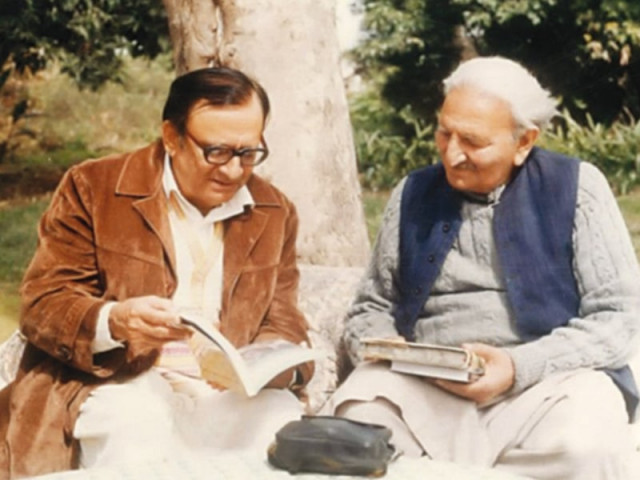Remembering Ghulam Agro: Son plans to bring out Agro’s unpublished writings
The famous Sindhi writer made generous contributions to interprovincial projects.

Ghulam Rabbani Agro with Pushto poet Ghani Khan. PHOTO COURTESY: AZIZUR REHMAN
Ghulam Rabbani Agro’s fans should hold their breaths as the famous writer’s son is going to bring out his father’s unpublished works.
“Most of my father’s books have not been republished,” said Agro’s eldest son, Azizur Rehman, as he shared his plans with The Express Tribune. “We are trying to compile his unpublished writings as the young generation must know what literary figures had done in the past and how literature flourished after the partition of the sub-continent.”
Agro, born on November 5, 1933, is one of the three Sindhi short-story writers without whom the post-Partition, early development of Sindhi literature is almost incomplete. He was the only person who started inter-provincial harmony through literature but unfortunately not a single person has followed his footsteps. He died in Hyderabad due to heart failure on January 18, 2010, and was buried in his native village Muhammad Khan Agro.

The writer will always be remembered for his golden words but his initiative to establish Pakistan Academy of Letters’ (Pal) regional offices in all four provinces and his efforts to translate the works of regional poets stand out. Agro also established the present Pal head office in Islamabad and a writers’ hall in it.
Agha Noor Muhammad Pathan, the resident director of Pal’s Sindh chapter, believes that no one has been able to match Agro’s work for interprovincial harmony. “I don’t remember any literary figure who had done such work. He was a man of commitment and perfectly carried out the responsibilities laid over his shoulders.”
Being the chairperson of Pal, Agro decided to introduce the works of regional Sufi poets, such as Sindh’s Shah Abdul Latif Bhittai, Punjab’s Bulleh Shah, Khyber-Pakhtunkhwa’s Rahman Baba and Balochistan’s Mast Tawakkal into Urdu. The literary conferences, which rarely happen now, were conducted in all four provinces with Agro’s endeavours. Under his supervision, the Sindhi Adabi Board managed to publish over 300 books.
Hailing from a small village of district Naushahro Feroze, Agro’s quest for knowledge pushed him to the renowned Madrassa Naushero Feroze, Hyderabad’s Phuleli College and Sindh Muslim College in Karachi. His companions included Sindhi writers, poets and intellectuals, such as Sobho Gianchandani, Shaikh Ayaz, Muhammad Ibrahim Joyo, Shaikh Hafeez and Tanveer Abbasi.
Agro, who is considered the third in the trio of Sindhi fiction writers, Jamal Abro and Shaikh Hafeez, wrote ‘Bure Hin Bhambhore Men’, which was translated into Urdu, English, Chinese, German and other languages.
It is considered one of the best contributions in world’s literature writings.
“He was one of the great fiction writers in Sindhi literature,” said Sindhi writer Taj Joyo. “He truly highlighted Sindhi culture and civilisation.” Joyo feels writers like Agro are rarely born. Agro’s ‘Buri Hin Bhambhore Men’ and ‘Sheedo Dharel’ are some of the classics of Sindhi literature, he added.
Agro was awarded Tamgha-e-Imtiaz in recognition of his literary services in 1986 and a shield award in recognition of academic achievements in 1995.
He served as a member of several scholarly bodies, including Quaid-e-Azam Academy in Karachi, Urdu Dictionary Board in Karachi, Iqbal Academy Lahore, Pakistan Film Censor Board, Jinnah Medical College Peshawar and the member of the Federal Public Service Commission. He also led Pakistani literary delegations to India, Bangladesh, Iran and China.
Published in The Express Tribune, November 5th,2013.

1724912122-0/Untitled-design-(1)1724912122-0-208x130.webp)

















COMMENTS
Comments are moderated and generally will be posted if they are on-topic and not abusive.
For more information, please see our Comments FAQ